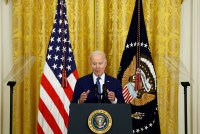Latest KFF Health News Stories
KFF Health News' 'What the Health?': Dancing Under the Debt Ceiling
House Republicans passed their plan to raise the nation’s debt ceiling, along with major cuts to health (and other domestic) programs. Unlikely to become law, it calls for new work requirements for adults on Medicaid. Meanwhile, state efforts targeting trans people bear a striking resemblance to the fight against abortion rights. Jessie Hellmann of CQ Roll Call, Shefali Luthra of The 19th, and Sarah Karlin-Smith of the Pink Sheet join KFF Health News chief Washington correspondent Julie Rovner to discuss these issues and more. Also this week, Rovner interviews Renuka Rayasam, who reported the latest KFF Health News-NPR “Bill of the Month” feature, about a specialist’s demand to be paid as much as $15,000 before treating a woman’s serious pregnancy complication.
¿Se podrá cumplir con la meta de terminar con la epidemia de VIH para 2030?
Debido a las interrupciones de la pandemia, los funcionarios federales no han tenido estimaciones sólidas de nuevas infecciones o el número de personas que viven con VIH desde finales de 2019.
US Officials Want to End the HIV Epidemic by 2030. Many Stakeholders Think They Won’t.
The federal government’s ambitious plan to end the HIV epidemic, launched in 2019, has generated new ways to reach at-risk populations in targeted communities across the South. But health officials, advocates, and people living with HIV worry significant headwinds will keep the program from reaching its goals.
The Biden Administration Vowed to Be a Leading Voice on Opioid Settlements But Has Gone Quiet
Billions of dollars are headed to state and local governments to address the opioid crisis. Policy experts and advocates expect the federal government to play a role in overseeing the use of the money. Failure to do so, they say, could lead to wasted opportunities. And, since Medicaid helps pay health care costs, the feds could have a claim to portions of states’ opioid settlements.
KFF Health News' 'What the Health?': Will They or Won’t They (Block the Abortion Pill)?
The Supreme Court is considering the future of the abortion pill mifepristone, after GenBioPro sued the FDA over limitations that effectively block generic production of the drug, a major part of the market. Congress is considering proposals that would impose Medicaid work requirements, crack down on pharmacy benefit managers, and more. And President Joe Biden moved to expand health coverage to young immigrants known as “Dreamers.” Rachel Cohrs of Stat, Sandhya Raman of CQ Roll Call, and Joanne Kenen of the Johns Hopkins Bloomberg School of Public Health and Politico join KFF Health News’ Mary Agnes Carey to discuss these issues and more.
A Progress Check on Hospital Price Transparency
Hospitals are facing mixed reviews regarding their efforts to comply with a federal requirement that they post information about prices related to nearly every health care service they provide.
Obamacare at 13: Biden and a KHN Reporter Remember
The White House gathered the people who helped pass the Affordable Care Act 13 years ago — partly to congratulate themselves but also to emphasize that they still have much work to do to make health care affordable.
KFF Health News' 'What the Health?': The Policy, and Politics, of Medicare Advantage
Medicare Advantage, the private plan alternative to traditional Medicare, is embroiled in a growing controversy over whether insurers are being overpaid and what it would mean to reduce those payments. Meanwhile, even as maternal mortality in the U.S. continues to rise, providers of care to pregnant women say they’re leaving states with abortion bans that prevent them from treating pregnancy complications. Margot Sanger-Katz of The New York Times, Jessie Hellmann of CQ Roll Call, and Joanne Kenen of the Johns Hopkins Bloomberg School of Public Health and Politico join KHN’s chief Washington correspondent Julie Rovner to discuss these issues and more.
End of Covid Emergency Will Usher in Changes Across the US Health System
The May 11 expiration of the federal government’s pandemic emergency declaration will affect patient care across a broad range of settings, including telemedicine, hospitals, and nursing homes.
KFF Health News' 'What the Health?': Biden Budget Touches All the Bases
Very little in the proposed budget released by the Biden administration is likely to become law, particularly with Republicans in charge of the U.S. House. Still, the document is an important statement of the president’s policy priorities, and it’s clear health programs are among those he feels are important. Meanwhile, five women who were denied abortions when their pregnancies threatened their lives are suing Texas. Shefali Luthra of The 19th, Victoria Knight of Axios, and Margot Sanger-Katz of The New York Times join KHN’s Julie Rovner to discuss these issues and more. Also this week, Rovner interviews Harris Meyer, who reported and wrote the two latest KHN-NPR “Bill of the Month” features. Both were about families facing unexpected bills following childbirth.
Planes de salud de Medicaid intentan proteger a sus miembros… y a sus ganancias
Estos planes, muchos administrados por titanes de los seguros, incluidos UnitedHealthcare, Centene y Aetna, han visto aumentar sus ingresos en miles de millones a medida que su membresía aumentaba en millones.
Medicaid Health Plans Try to Protect Members — And Profits — During Unwinding
States are turning to the big health insurance companies to keep Medicaid enrollees insured once pandemic protections end in April. The insurers’ motive: profits.
Biden Administration Urged to Take More Aggressive Steps to Relieve Medical Debt
Consumer and patient advocates push for new federal rules to protect Americans from debt collectors and force hospitals to make financial assistance more accessible.
KFF Health News' 'What the Health?': March Medicaid Madness
President Joe Biden and Republicans in Congress spent last month sparring over whether to shield Medicare and Social Security from budget cuts — leading some to wonder if Medicaid was on the table instead. Biden and Democrats say no, but some Republicans seem eager to trim federal spending on the health program for Americans with low incomes. And ready or not, artificial intelligence is coming to medical care. Benefits, as well as unintended consequences, are likely. Alice Miranda Ollstein of Politico, Rachel Cohrs of STAT News, and Lauren Weber of The Washington Post join KHN’s chief Washington correspondent, Julie Rovner, to discuss these issues and more.
Biden Promises to Fight GOP on ‘Gutting’ Medicaid. Budget Talks Seem Like Another Story.
As many lower-income Americans prepare to lose pandemic-era access to Medicaid, President Joe Biden vowed to stop Republicans from making deeper cuts to lower the national debt. Other changes may still be up for discussion.
Se acaba la era de las vacunas y las pruebas gratuitas contra covid. ¿Quién va a pagar?
Las personas podrán obtener estas vacunas a bajo costo o sin costo mientras duren los suministros del gobierno. Luego, dependerá de su seguro de salud.
Era of ‘Free’ Covid Vaccines, Test Kits, and Treatments Is Ending. Who Will Pay the Tab Now?
Insurers, employers, and taxpayers will all be affected as drug manufacturers move these products to the commercial market.
KFF Health News' 'What the Health?': A Health-Heavy State of the Union
President Joe Biden’s 2023 State of the Union address leaned heavily on health care issues. Biden took a victory lap for recent accomplishments like capping prescription drug costs for seniors on Medicare. He also urged Congress to make permanent the boosted premium subsidies under the Affordable Care Act, and he sparred with Republicans on threats to cut Social Security and Medicare. Also this week, both sides in the abortion debate are bracing for a court decision out of Texas that could, at least temporarily, make the abortion pill mifepristone illegal nationwide. Alice Miranda Ollstein of Politico, Rachel Cohrs of Stat, and Sarah Karlin-Smith of the Pink Sheet join KHN chief Washington correspondent Julie Rovner to discuss these issues and more. Also this week, Rovner interviews Kate Baicker of the University of Chicago about a possible middle ground in the effort to get universal health insurance coverage.
Políticas de salud fueron tema prominente en el discurso del Estado de la Unión de Biden
A diferencia de sus discursos anteriores, éste fue a Cámara llena, y sin limitaciones por covid-19. Y los legisladores en la audiencia, tanto partidarios como opositores, parecían estar de un humor estridente.
Health Policies Were a Prominent Theme in Biden’s State of the Union Speech
Our partners at PolitiFact fact-checked a range of President Joe Biden’s statements, including key health-related comments.


















